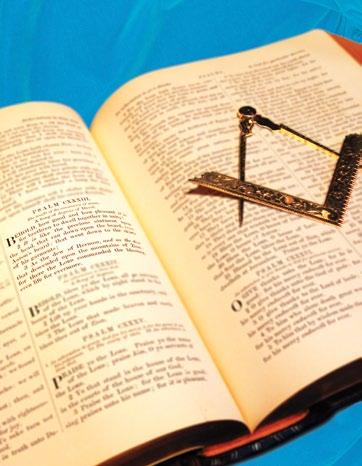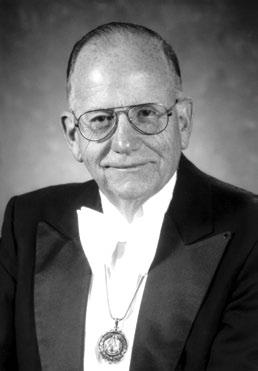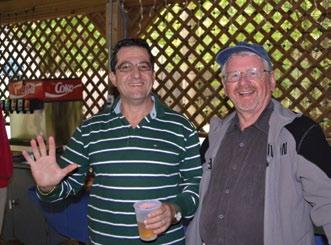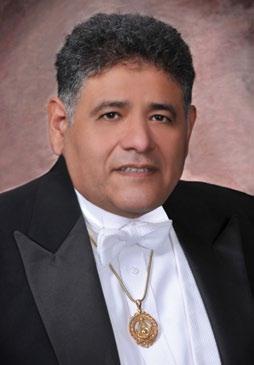
5 minute read
Of Men and Masons: Why Freemasonry is Not a Volunteer Organization
Of Men and Masons:
Why Freemasonry is not a Volunteer Organization
Marcus A. Trelaine
Grand Preceptor
It is sometimes suggested that Freemasonry is only when the time or purpose is convenient to our a “volunteer” organization. If by voluntary, one interest or need? Is a volunteer obliged by any bond speaks from the perspective of liberally applying to pay dues, contribute to the relief of others, or “charitable” generosity, benevolence, tolerance or communicate lessons and emulate defined examples? even an enlightened altruism, than perhaps FreemaIs it merely a voluntary exercise to help a brother in sonry could be considered a volunteer organization. need, while holding no expectation for ourselves? Indeed, one must willingly seek out the Craft by knockAre we able to suspend our rules and customs ing at the door; to if they become too enthusiastically elicit laborious, consuming, its mysteries through or conservative? purposeful labor and interpretative symbols; and finally set upon an arduous road of reflection and selfdiscovery in search of light. Every one of these critical actions must be voluntarily initiated and resolved if a man is to gain any benefit from our ancient and noble art. Progression in Freemasonry does not specifically mean a steady advancement of chairs in a line of officers, but instead should more Moreover, if Freemasonry is a volunteer organization, does that not make all Master Masons volunteers? As volunteers, does anyone have a right to expect or insist on the actions of others if it doesn’t suit their personal interest? Is it acceptable for the officers Even the practiof a Lodge to show cal needs of regular attendance, service closely allude to the up or conduct a meeting in any manner as an officer, and the very vows, rituevolution of the mind, they choose, or even attend at all? After all, als and ceremonies which we “voluntarily” heart and soul of a man shouldn’t it be sufficient that any member take upon ourselves, voluntarily took time require our own “free will and accord”. With towards awareness and from their busy schedule to attend, much so many voluntary considerations, it is inner contentment. less take a station or place? Is it reasonable understandable why to presume the Master Freemasonry could be should present himself considered a volunfor election and instalteer organization. lation in a highly qualified, prepared and experienced But if we pursue this line of reasoning more deeply, perhaps our first question to ask is, “To what extent does our volunteerism compel our obedience?” Do manner? Certainly, we could hold no expectations upon ourselves, or each other to perform, if Freemasonry were indeed a “volunteer organization”. the obligations we repeat, with our hands upon the Fortunately, our Craft is a society of men who can Volume of Sacred Law, allow us to apply our pledges best work and best agree. By sharing a common
union of goodwill, service and duty we have mutually East if the knowledge, skills and ability to perform are formed a sacred bond of brotherly love, relief, and not sufficiently developed to perform at the highest trust in one another. level possible. Indeed, it is a most conscientious and While there are indeed some voluntary aspects to the Craft, such as whether one will progress through honorable man who is keenly aware of his limitations and the ways he may best serve his brother. the various bodies; serve as an officer — and more Perhaps the most visual example of volunteerism especially as Master of a Lodge; without the comis the U.S. armed forces. Once commissioned or pelling attachments we make with one another we enlisted, the voluntary nature of service is transshare only a free will and accord, but hold no obligaformed to one of duty. Gone are the days of sleeping tion to serve the tenets of Freemasonry. However, in, calling in sick, quitting in frustration, or negotiatthe moment we kiss the Holy Book, these voluntary ing a “better deal”. Every man is expected to muster decisions become on time, obey the binding promises orders of superiors, and take on the courageously fight mantle of duty and the battles, and responsibility. In ultimately win the this instance, Freecampaign in which masonry sheds they are engaged. itself of its similarities with every other volunteer organization. Men in arms expect and demand one another to perform, excel, defend Accepting the and achieve – even increasing responsiwhen the situation bilities of the role appears hopeless. of Master Mason, elected officer, or Master of the Lodge was something accomplished of one’s own free will and accord. It therefore inherently holds and necessitates the discharge of a higher standard in commitment, excellence and fidelity. Such agreements Photography by Arthur W. Pierson, Falls Church, Virginia. Freemasonry does no less in rendering its obligations upon the brethren. Although never by force of arms, there is a force of will in making a covenant with one another and to the Great Architect of the Universe to pursue a path of light that we may become the and advancements hold an expressed “The moment we kiss the Holy Book, these voluntary decisions become binding promises and take on the mantle of duty and very best we are able to be. interest, ability and obligation to those whom have placed their trust and confidence in the “voluntary” acceptance of these roles. responsibility.” While members of a “volunteer organization” may be willing to join together to work on behalf of others without pay or other tangible gain; Not every Mason will serve the Craft as a Worshipful members in Freemasonry are accepted into a fraterMaster; nor should they. Progression in Freemasonry nal society to take upon themselves the obligation to does not specifically mean a steady advancement of observe the landmarks and keep the secrets of Freechairs in a line of officers, but instead should more masonry. In short, every man “volunteers” to become closely allude to the evolution of the mind, heart and a Mason, but every Mason must consent to the Order soul of a man towards awareness and inner contentof the Craft. This is our pact. It is neither voluntary ment. Thus, there should be neither embarrassment nor negotiable, and distinguishes a Master Mason nor regret in passing an easy opportunity to sit in the from the rest of the community. n









